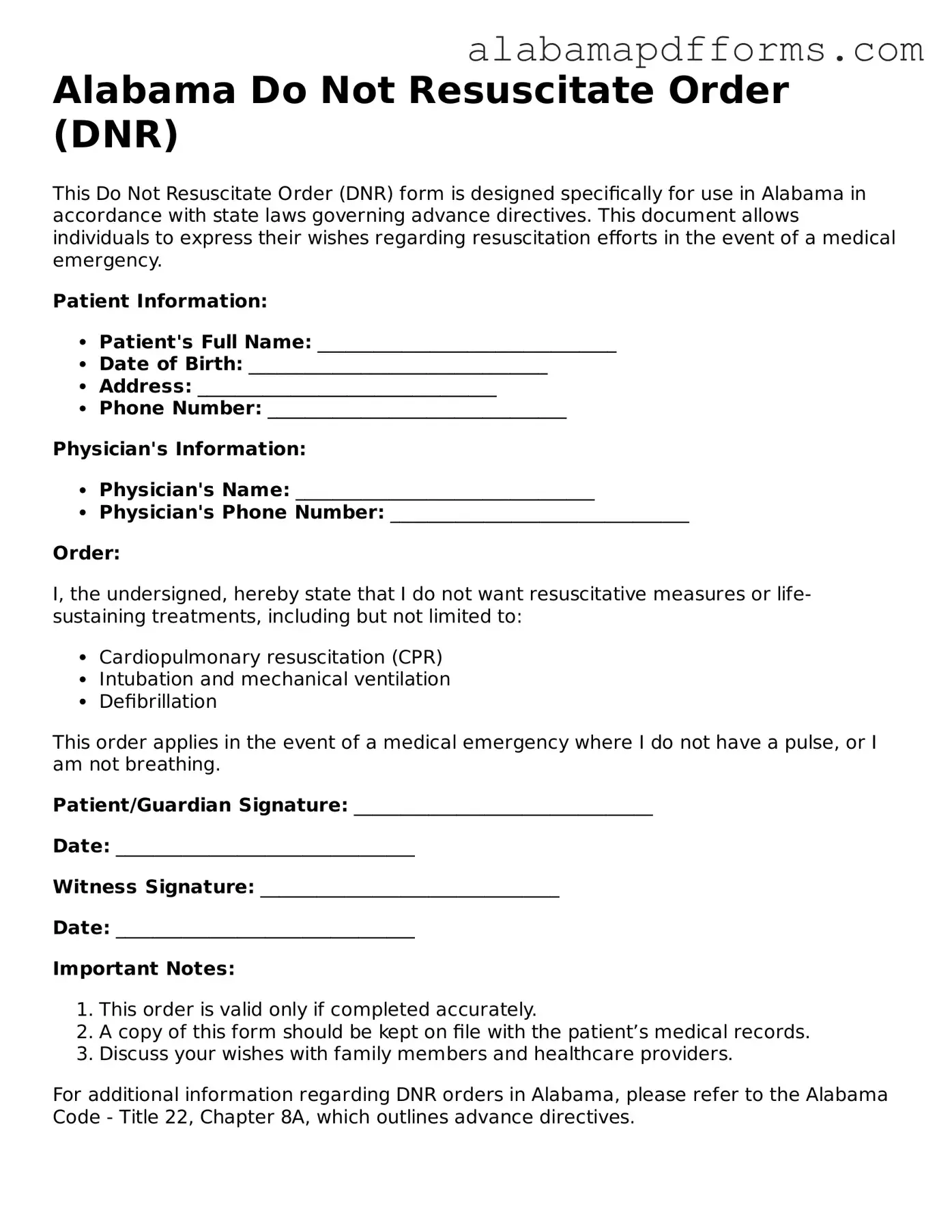The Alabama Do Not Resuscitate (DNR) Order form is similar to a Living Will. A Living Will outlines an individual’s preferences regarding medical treatment in situations where they are unable to communicate their wishes. Both documents serve to express a person's desires about end-of-life care, particularly concerning life-sustaining treatments. While a DNR specifically addresses resuscitation efforts, a Living Will covers a broader range of medical interventions, ensuring that individuals receive care aligned with their values and preferences.
Another document that resembles the DNR Order is a Healthcare Power of Attorney. This legal document allows an individual to designate someone else to make medical decisions on their behalf if they become incapacitated. Like the DNR, it focuses on medical care preferences but provides a broader scope by allowing the appointed agent to make various healthcare decisions, including those related to resuscitation and other life-sustaining treatments.
The Physician Orders for Life-Sustaining Treatment (POLST) form is also similar to the DNR Order. POLST is a medical order that translates a patient’s wishes about treatment into actionable physician orders. It is designed for patients with serious illnesses and includes preferences for resuscitation and other life-sustaining measures. While both documents aim to respect patient wishes, POLST is more comprehensive and is intended to be used in conjunction with a DNR, especially in emergency situations.
A Do Not Hospitalize (DNH) order is another document that bears similarities to the DNR Order. This directive indicates that a patient does not wish to be admitted to a hospital for treatment, particularly in end-of-life scenarios. Both documents reflect a patient’s desire to limit medical interventions, but the DNH specifically addresses hospitalization, while the DNR focuses on resuscitation efforts.
For those considering the formation of a Limited Liability Company, understanding the process is essential. One key component is the comprehensive Operating Agreement utilization, which provides a framework for the ownership structure and member responsibilities.
The Advance Directive is also akin to the DNR Order. An Advance Directive encompasses both a Living Will and a Healthcare Power of Attorney. It allows individuals to express their healthcare preferences and appoint a decision-maker. While the DNR specifically pertains to resuscitation, an Advance Directive can include a wide range of medical treatment preferences, ensuring that all aspects of care are considered.
The Medical Orders for Life-Sustaining Treatment (MOLST) form is another document that shares similarities with the DNR Order. MOLST is designed to be a portable medical order that communicates a patient's treatment preferences across different healthcare settings. Like the DNR, it emphasizes the patient's wishes regarding resuscitation but also addresses other medical interventions, making it a more comprehensive tool for managing care.
A Comfort Care Order is also comparable to the DNR Order. This document prioritizes comfort and quality of life over aggressive medical treatments. It may include instructions to avoid resuscitation efforts while focusing on palliative care measures. Both documents aim to ensure that patients receive care aligned with their wishes, particularly in situations where aggressive interventions may not be desired.
Finally, the Do Not Intubate (DNI) order is similar to the DNR Order in that it specifically addresses a patient's wishes regarding intubation and mechanical ventilation. While the DNR focuses on resuscitation efforts, the DNI clearly states that the patient does not wish to be placed on a ventilator. Both documents reflect a desire to limit invasive medical procedures at the end of life, ensuring that patients receive care that aligns with their personal values.

